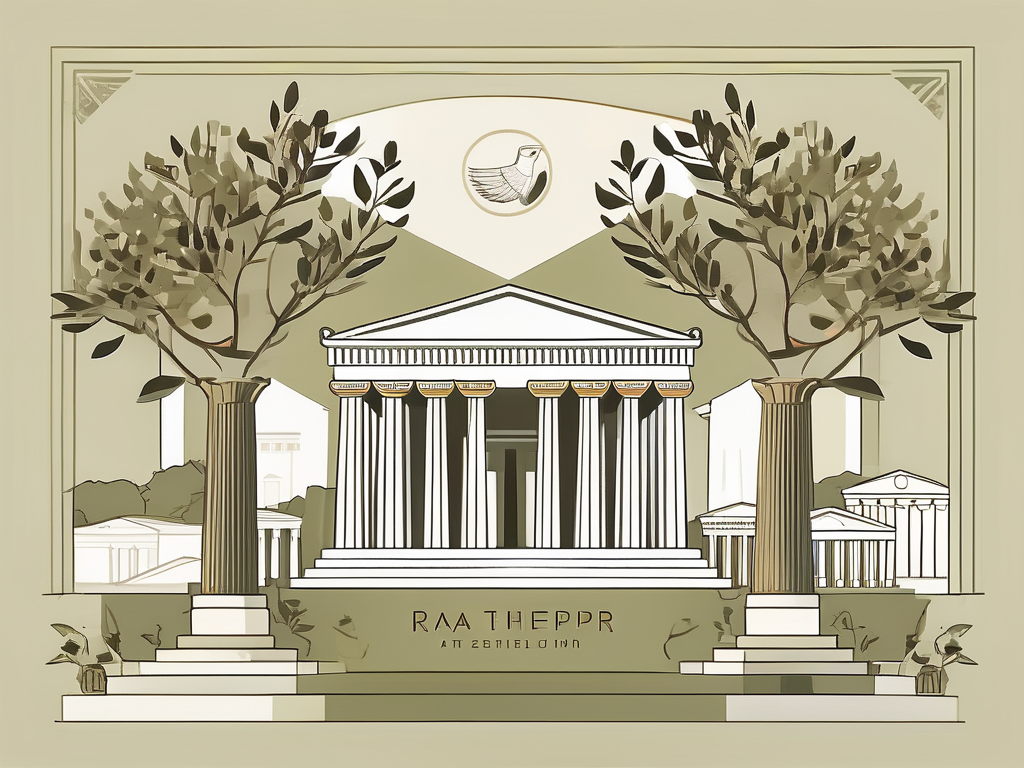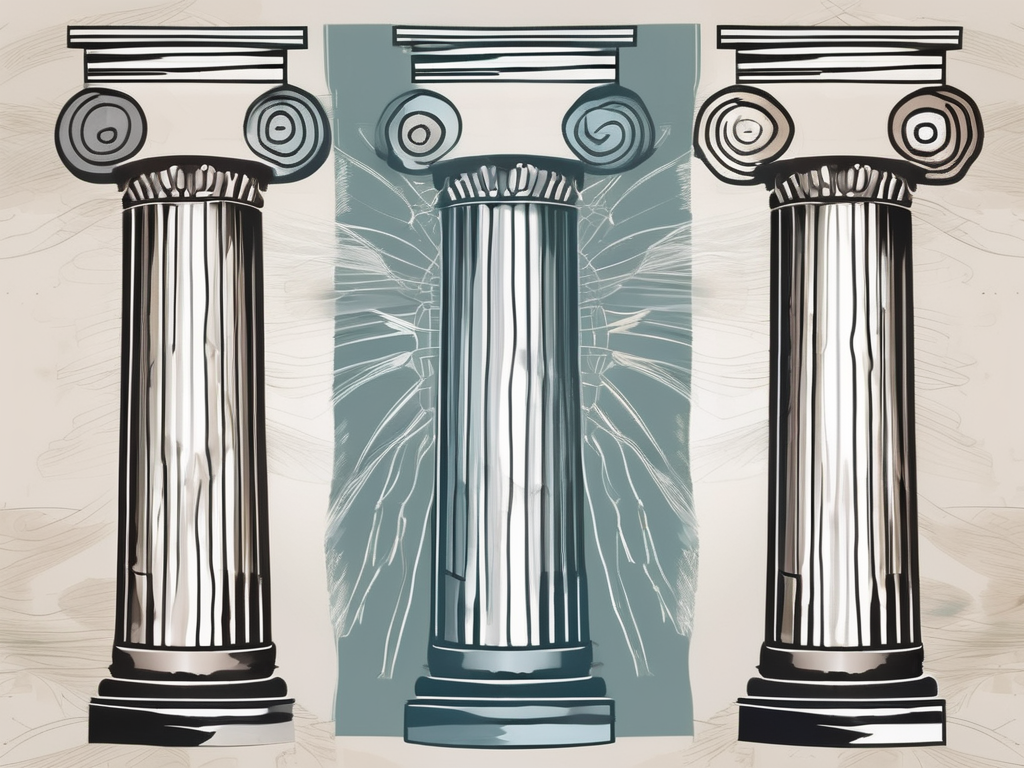Have you ever wondered who the first philosopher in history was? Look no further than Thales of Miletus, an influential figure in ancient Greece. Thales, known as one of the Seven Wise Men of Greece, made significant contributions to the field of philosophy. His ideas and beliefs laid the foundation for future thinkers and shaped the course of Western philosophy. In this article, we will delve into the life, thoughts, and enduring legacy of Thales.
Understanding Thales: The Man Behind the Philosophy
Before we delve into Thales’ philosophy, it is important to understand the man behind the ideas. Thales was born in Miletus, a wealthy city located in present-day Turkey, around 624 BC. He was different from his contemporaries, as he did not come from a noble or aristocratic background. Instead, Thales was a self-made man, relying on his intelligence and passion for knowledge to make his mark on the world.
Thales’ early life remains shrouded in mystery, but it is believed that he received a well-rounded education. He was well-versed in mathematics, geometry, astronomy, and natural sciences. These disciplines would later play a vital role in shaping his philosophical theories. Thales’ insatiable curiosity drove him to seek knowledge beyond the confines of his hometown.
As a young man, Thales embarked on a journey of exploration and discovery. He traveled to Egypt, where he studied the ancient wisdom of the Egyptians. It was during his time in Egypt that Thales became fascinated with the Nile River and its annual flooding. He observed the patterns and cycles of nature, laying the foundation for his later philosophical ideas.
Thales’ travels did not end in Egypt. He also journeyed to Babylon, where he immersed himself in the rich intellectual and cultural environment of the Mesopotamians. It was in Babylon that Thales encountered advanced mathematical concepts and astronomical observations that further expanded his understanding of the natural world.
Upon returning to Miletus, Thales began to develop his own philosophical approach. He was an unconventional thinker for his time. He sought to explain natural phenomena through rational and scientific means rather than attributing them to mythical gods. Thales believed that the universe operated according to natural laws, which could be understood through observation and reasoning. His philosophical approach, known as naturalism, set him apart from his contemporaries.
Thales’ naturalistic philosophy had a profound impact on the development of Western thought. His ideas laid the groundwork for future philosophers and scientists, who would build upon his theories and expand our understanding of the natural world. Thales’ legacy as a self-made intellectual and a pioneer of rational thinking continues to inspire generations of thinkers to this day.
Thales’ Major Philosophical Contributions
Thales’ pioneering ideas revolutionized the field of philosophy and laid the groundwork for future thinkers. Let’s explore his major philosophical contributions:
Theories on Natural Phenomena
Thales was fascinated by the natural world and sought to understand the fundamental principles governing it. He posited that water was the primary substance from which all things originated. According to Thales, everything, be it the earth, air, or celestial bodies, had its roots in water. This theory, known as hylozoism, was a significant departure from the prevailing mythological explanations.
Thales’ theory of hylozoism sparked intense debates among his contemporaries. Some embraced his ideas, recognizing the potential for a more rational understanding of the natural world. Others, however, clung to the traditional mythological explanations, reluctant to abandon long-held beliefs. These debates fueled intellectual curiosity and set the stage for further philosophical exploration.
Thales’ theories on natural phenomena also had practical implications. His belief that water was the primary substance led him to study the properties of water in depth. He observed its transformative nature, witnessing how it could change from a solid to a liquid or a gas. Thales’ observations laid the foundation for future scientific investigations into the properties of matter.
Thales and Abstract Thought
Thales’ philosophical inquiries extended beyond the natural realm. He engaged in abstract thinking and posed questions that challenged traditional beliefs. One of his notable achievements was laying the foundation for deductive reasoning. Thales encouraged critical thinking and urged his contemporaries to question the status quo. His emphasis on reason and logic planted the seeds for future philosophical developments.
Thales’ exploration of abstract thought led him to ponder the nature of existence itself. He questioned the origins of the universe and the nature of reality. These inquiries pushed the boundaries of philosophical discourse and paved the way for future thinkers to delve deeper into metaphysical questions.
Thales’ emphasis on reason and logic also had a profound impact on the development of mathematics. His deductive reasoning methods influenced the work of mathematicians who came after him, such as Pythagoras and Euclid. Thales’ legacy in the field of mathematics cannot be overstated, as his contributions laid the groundwork for the development of geometric proofs and mathematical reasoning.
The Impact of Thales on Greek Philosophy
Thales’ ideas reverberated throughout the world of ancient Greek philosophy. Let’s explore the impact he had on subsequent thinkers:
Thales of Miletus, often hailed as the first philosopher, made significant contributions to the development of Greek philosophy. Born in the 6th century BCE, Thales was a renowned thinker and mathematician who sought to explain the natural world through rational inquiry. His ideas not only shaped the course of ancient Greek philosophy but also left a lasting legacy that continues to influence modern philosophical thought.
Influence on Later Philosophers
Thales’ ideas laid the groundwork for the Milesian School of Philosophy, which was carried forward by Anaximander and Anaximenes. His concept of a single element giving rise to everything influenced the Presocratic philosophers who followed him. Thales proposed that water was the fundamental substance from which all things originated. This notion of a primary element became a central theme in the works of subsequent philosophers, such as Anaximander, who posited that an infinite substance called “apeiron” was the source of all existence. Anaximenes, another disciple of Thales, further expanded on these ideas by suggesting that air was the fundamental element.
Thales’ ideas left an indelible mark on the development of Western philosophy, setting the stage for further exploration and intellectual growth. His emphasis on seeking rational explanations for natural phenomena challenged traditional mythological narratives and paved the way for a more scientific approach to understanding the world.
Thales’ Legacy in Modern Philosophy
Thales’ contributions to philosophy extend well beyond ancient Greece. His emphasis on rationalism and scientific inquiry resonated with later philosophers, including René Descartes, who famously proclaimed, “I think, therefore I am.” Thales’ spirit of curiosity and thirst for knowledge continue to shape modern philosophical thought, reminding us of the enduring relevance of his ideas.
Descartes, a 17th-century French philosopher, embraced Thales’ commitment to reason and skepticism. Descartes’ method of doubt, which aimed to establish a foundation of knowledge through rigorous questioning, echoes Thales’ emphasis on critical thinking. Both philosophers recognized the importance of challenging existing beliefs and seeking rational explanations for the mysteries of the universe.
Thales’ influence can also be seen in the scientific revolution of the 17th century. His belief in the power of observation and empirical evidence laid the groundwork for the development of modern scientific inquiry. Thales’ approach to understanding the natural world through systematic observation and logical reasoning provided a template for future scientists, such as Isaac Newton and Galileo Galilei, who built upon his ideas and revolutionized our understanding of physics and astronomy.
Furthermore, Thales’ philosophical legacy extends beyond the realm of science. His emphasis on the importance of reason and rationality in shaping our understanding of the world has had a profound impact on various branches of philosophy, including epistemology and metaphysics. Thales’ commitment to seeking truth through logical inquiry continues to inspire philosophers to question assumptions, challenge dogma, and pursue knowledge.
In conclusion, Thales’ ideas had a profound and far-reaching impact on the world of Greek philosophy. His contributions to the Milesian School of Philosophy and his emphasis on rationalism and scientific inquiry laid the foundation for future philosophical and scientific advancements. Thales’ enduring legacy can be seen in the works of later philosophers and scientists, as well as in the ongoing pursuit of knowledge and understanding in modern society.
Criticisms and Controversies Surrounding Thales’ Philosophy
Like any influential thinker, Thales faced criticisms and controversies. Let’s explore the debates surrounding his ideas:
Debates on Thales’ Ideas
Thales’ theory of water as the primary substance drew both admiration and skepticism. While some lauded his emphasis on rational explanation, others criticized him for oversimplifying the complexities of the natural world. These debates intensified in the years following Thales’ death, as philosophers sought to build upon or refute his theories.
The Relevance of Thales’ Philosophy Today
Many contemporary philosophers still find value in Thales’ philosophy. His emphasis on rational thinking and observation can be seen as a precursor to the scientific method. Thales’ ideas provide a reminder that questioning and seeking rational explanations are essential for intellectual and scientific progress.
Exploring Thales’ Lesser-Known Works
While Thales is predominantly known for his philosophical ideas, he also left behind a body of lesser-known works:
Thales’ Writings and Teachings
Unfortunately, none of Thales’ original writings have survived to this day. However, his ideas and teachings were passed down through his disciples. Thales’ work was fundamental in shaping the attitudes and direction of subsequent philosophers, ensuring that his legacy endured even without written records.
Unraveling Thales’ Unsolved Philosophical Puzzles
Thales’ philosophy is not without its mysteries and unsolved puzzles. Scholars and philosophers continue to explore and interpret Thales’ ideas, delving deeper into the questions he posed. By seeking to understand Thales’ unanswered questions, we can gain insight into his thinking and the challenges he grappled with.
In Conclusion
Thales’ influential role in ancient Greek philosophy cannot be overstated. His naturalistic approach, theories on natural phenomena, and emphasis on rational thinking laid the foundation for future philosophical developments. Thales’ curiosity and intellectual acumen sparked a revolution in thought, influencing thinkers for centuries to come. As we continue to explore and interpret his ideas, we draw inspiration from Thales’ quest for truth and understanding.












